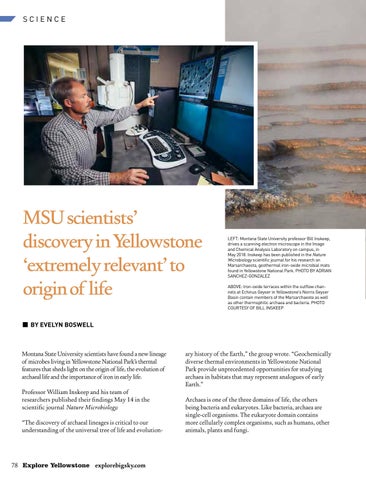SCIENCE
MSU scientists’ discovery in Yellowstone ‘extremely relevant’ to origin of life
LEFT: Montana State University professor Bill Inskeep, drives a scanning electron microscope in the Image and Chemical Analysis Laboratory on campus, in May 2018. Inskeep has been published in the Nature Microbiology scientific journal for his research on Marsarchaeota, geothermal iron-oxide microbial mats found in Yellowstone National Park. PHOTO BY ADRIAN SANCHEZ-GONZALEZ ABOVE: Iron-oxide terraces within the outflow channels at Echinus Geyser in Yellowstone’s Norris Geyser Basin contain members of the Marsarchaeota as well as other thermophilic archaea and bacteria. PHOTO COURTESY OF BILL INSKEEP
BY EVELYN BOSWELL
Montana State University scientists have found a new lineage of microbes living in Yellowstone National Park’s thermal features that sheds light on the origin of life, the evolution of archaeal life and the importance of iron in early life. Professor William Inskeep and his team of researchers published their findings May 14 in the scientific journal Nature Microbiology. “The discovery of archaeal lineages is critical to our understanding of the universal tree of life and evolution-
78 Explore Yellowstone explorebigsky.com
ary history of the Earth,” the group wrote. “Geochemically diverse thermal environments in Yellowstone National Park provide unprecedented opportunities for studying archaea in habitats that may represent analogues of early Earth.” Archaea is one of the three domains of life, the others being bacteria and eukaryotes. Like bacteria, archaea are single-cell organisms. The eukaryote domain contains more cellularly complex organisms, such as humans, other animals, plants and fungi.














